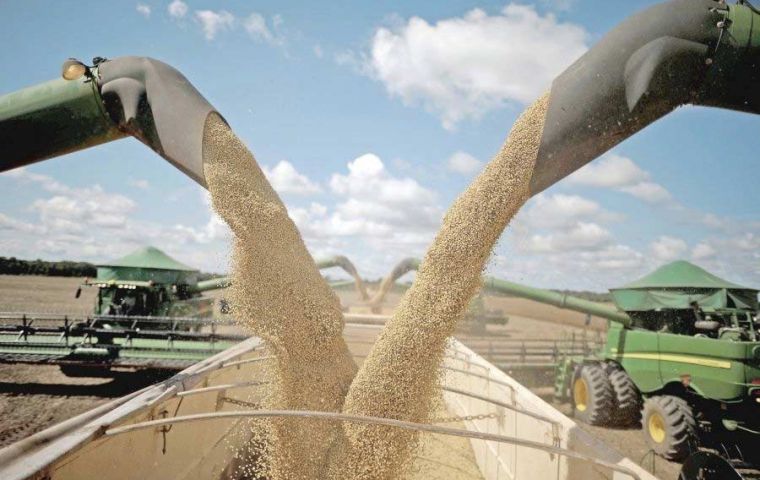MercoPress. South Atlantic News Agency
Record export of Brazilian food commodities, but prices are falling
 There are 73 million tons, 20% more than in the same period of 2022. In the last 12 months, Brazil has already exported 91 million tons of soy
There are 73 million tons, 20% more than in the same period of 2022. In the last 12 months, Brazil has already exported 91 million tons of soy Brazilian primary goods exports could surpass last year's export record of US$ 159 billion, be it not for the sharp drop in commodity prices on the foreign market.
Soybeans show this scenario of falling prices, which, in July, were 22% lower than those of the same month in 2022. Even so, exports of the oilseed have already accumulated US$ 38 billion this year, surpassing the US$ 35 billion of the same last year period.
The increase in foreign exchange is due to the acceleration of volume sold. There are 73 million tons, 20% more than in the same period of 2022. In the last 12 months, Brazil has already exported 91 million tons of soy, with record revenues of US$ 50 billion.
The effect of the drop in international prices is also severe for animal proteins. The current value of a ton of beef is 28% lower than a year ago. In this same period, chicken meat fell 13%, and pork rose 4%, according to data from Secex (Secretary of Foreign Trade).
Even so, the increase in the volume of chicken meat placed on the foreign market guaranteed US$ 5.5 billion in revenue for the sector in the period from January to July. Beef, on the other hand, had a 24% retraction in revenues, which fell to US$ 5.1 billion.
With the pressure of soybean exports over, the ports should receive an even greater volume of corn in the second half. So far, 16 million tons have already been shipped, but estimates are for a level higher than 50 million, with Brazil returning to lead world exports temporarily.
The average price of cereal in July, compared to the same month last year, had a retraction of 11%, according to Secex. Despite the drop, revenues hit US$ 1 billion last month, bringing the year-to-date to US$ 4.5 billion, 52% more than in 2022.
Brazil gains space in the foreign market in soybeans and corn due to the super harvest obtained in the country, unlike other major producers that had declines caused by serious weather problems. The Brazilian soy harvest reached a record 156 million tons, and that of corn could be close to 136 million.
Two other negative points for exports are cotton and coffee, which are also experiencing falling prices. In July, cotton trading prices were 25% lower than a year ago, according to Secex.
The drop in prices also occurs in imported inputs, which eases the burden on producers’ pockets. Fertilizer had an average reduction of 58% in July values, compared to last year, and the sector’s accumulated expenses fell by 49% in the first seven months of this year.
Expenditure on imports of agrochemicals fell by 35%. In addition to an average reduction of 7% in July prices, the country imported a volume 43% lower than from January to July 2022.
Record for corn – The 2022/23 corn crop should reach 139 million tons, a volume that was unimaginable until recently. The data is from the consultancy Stonex, which fattened its previous forecast based on the prospects of an improvement in the off-season and in the third harvest.
Stonex analysts also confirm the soybean record in 2022/23 at the level of 158 million tons and forecast 163 million for 2023/24. Exports for the 2022/23 harvest should reach 98 million tons, and those for 2023/24, 104 million, according to calculations by the consultancy.
Likewise beef exports during July declined, despite an excellent first half year.Secex data compiled by the Center for Advanced Studies in Applied Economics (Cepea), exports totaled 160.80 thousand tons, representing a drop of 16.57% compared to June 2023 and 3.88% less than that registered in July 2022.
This scenario, according to Cepea researchers, is also the lowest volume shipped by the country in a month of July since 2019. One of the main causes pointed out for this decline is the drop in prices paid for the national protein. The average value of meat exported in July was US$ 4,740.31, the lowest since March 2021 and represented a reduction of 6.21% compared to June 2023 and a significant decrease of 27.62% compared to to July 2022.
Cepea researchers claim that this scenario of negative numbers in the international market is justified by the current situation of the world economy. In addition, high inflation, rising interest rates and increased food production in some countries have directly impacted the Brazilian beef export sector.
With these economic conditions, beef producers in Brazil face challenges to remain competitive in the international market. The prospects for the coming months remain uncertain, as they will depend on the evolution of the global economic situation and on measures that may be taken to face the challenges presented.




Top Comments
Disclaimer & comment rulesCommenting for this story is now closed.
If you have a Facebook account, become a fan and comment on our Facebook Page!